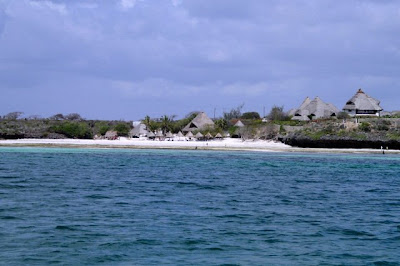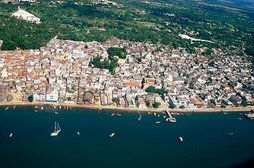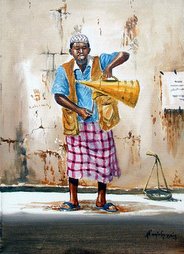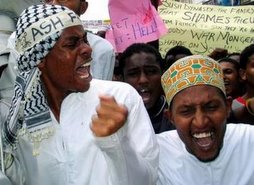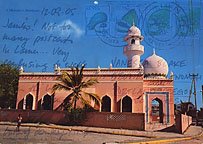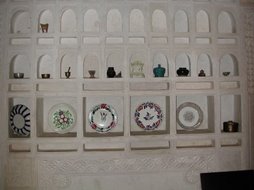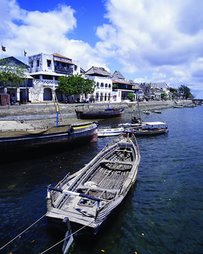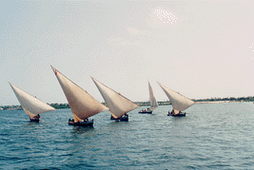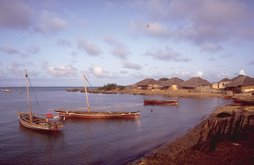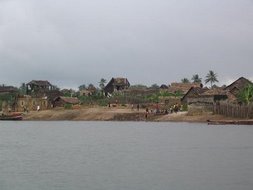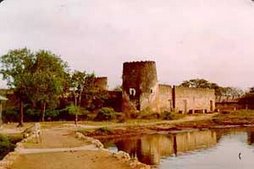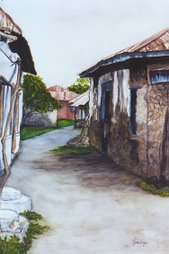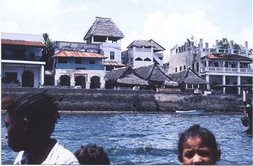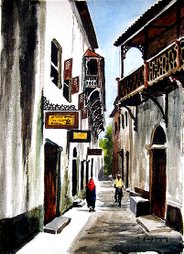MOMBASA OLD TOWN'S JAHAZI COFFEE HOUSE PROVIDES
SPACE FOR COMMUNITY AND INTER-CULTURAL DIALOGUE
Coastweek - - In traditional Swahili society, it is customary to serve coffee or tea when people come together and share stories, or just to pass the time.
| It is a meeting place to ex-change ideas, thoughts and opinions, a creative cultural and intellectual space where young and old, rich and poor; residents and visitors can enjoy a tea or coffee and engage in dialogue. There were once plenty of cafes and restaurants throughout the old town in Mombasa but very few remain until just a few months ago when three teachers from the Aga Khan Academy ventured into old town to revive the tranquil tradition. "We realised that this was something that was popular here when we heard stories from the old folk. "We spoke with a lot of people in the community who said that there was no place in the old town where people could come, have a coffee and snacks at prices which they could afford," says Aziz Batada. They chanced on the ideal space through a friend Abdallah, who owns a furniture shop and told them that there was a vacant shop across from his. Although it was run down, it had a lot of the integral architectural elements that you find in classic Swahili architecture in tact: the limestone walls, niches that have cut Arabic designs, the wooden beams in the ceiling and Arabic style doors and windows. Within months, the abandoned house was transformed into a nostalgic space buzzing with people from all over the world. The Jahazi Coffee House is all about providing a space for community and inter-cultural dialogue. As George Killeen explains: "We would like to see this place work where foreigners and travellers can come through, have a tea or coffee and are able to mingle, mix and chat with the local community so that they get something beyond what they read in guide books. "It also helps the folks from here in that they get to meet people from elsewhere and not just see them as tourists but actually sit down and share ideas or talk about global events. "A coffee shop seems to be the ideal vehicle for that to take place." However, there is so much more on offer than just a cup of coffee and talk. Other features include a community learning centre which holds various resources such as books, magazines, news papers, art work and historical pieces which reflect the diversity of Mombasa. A public library has been established which will also act as a classroom as well as a space for community meetings. Classroom time is offered everyday from four to five where some of the employees and others volunteer and work with small children giving them English and Maths lessons, and helping them to read. Jahazi's cultural space seems to have no boundaries. George's background as an artist inevitably led him to wanting to understand how artists function at the coast. "There are so many young artists, painters, writers, musicians that are on the Swahili coast and they have practically no place to display their work." Therefore, it almost seemed natural for the coffee house to double as an art gallery and today, Jahazi Coffee House gives these artists an opportunity to display and sell their work with the walls filled with a host of images ranging from contemporary art from around the country to imagery of Swahili culture. For example, the unique duo, Tito and Gachoki who work collaboratively on the same piece to create beautiful paintings, drawings with imagery from the old town and the sea coast and framed with interesting antique wood or it can be painted on glass or on silk. Others include Ed Cross who has been living on the coast for many years making somewhat surreal sculptures from bits of driftwood and old wood from canoes and boats. The space has also been used to show work by well known Miriam Kyambi who can be very abstract, thought provoking and challenging to the viewer. Art exhibitions will be a constant feature of Jahazi Coffee House as well as regular musical and poetry performances which are in the pipeline. I asked Naheed Bardai what inspired them to take on this noble initiative: | |
"We realised that all three of us were keen to do something in the community that would help promote the cultural heritage because the old town is filled with beautiful buildings. Unfortunately, they are falling apart."
.
Coastweek - - Art exhibitions will be a constant feature
of Jahazi Coffee House.
The area has been sighted to become a UNESCO world heritage site.
On a bigger picture, the three teachers are involved in community service with the Aga Khan Academy: "his Highness' vision is that we give back to the community as teachers and students, we get involved with the community, we share our expertise, and we share our resources with the community and to help those less fortunate and less privileged." |
Jahazi Coffee House is situated on Ndia Kuu road only five minutes walk from Fort Jesus.
Opening hours are from 8.00 a.m. to 7.00 p.m. daily.



